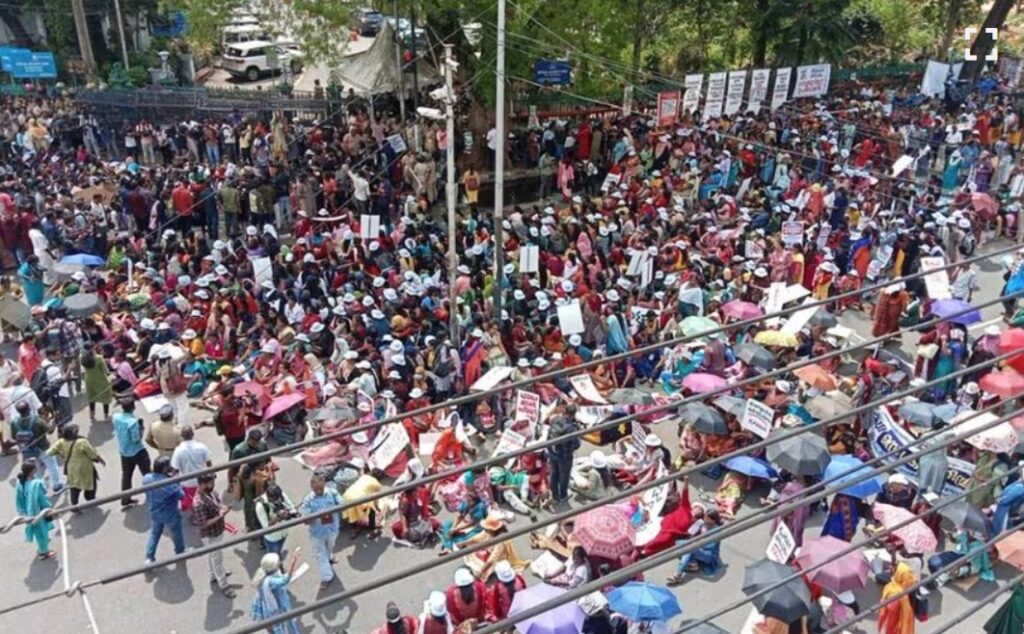
The ongoing indefinite strike by Kerala’s Accredited Social Health Activists (ASHA) workers has brought to light the struggles of India’s frontline healthcare workforce. The ASHA workers’ strike is for better pay, retirement benefits, and recognition as formal employees, challenging the systemic undervaluation of their contributions. This blog delves into the historical context, current developments, and broader implications of the strike while also examining similar movements across India.
Who Are ASHA Workers and Why Are They Striking?
ASHA workers are the backbone of India’s rural healthcare system. Introduced in 2005 under the National Rural Health Mission (NRHM), they act as a bridge between marginalized communities and government health services. Their responsibilities include maternal and child healthcare, immunization drives, disease surveillance, and promoting hygiene practices.
Imagine being a superhero without a cape—just a simple saree or salwar kameez—and your superpower is ensuring that everyone in your village knows when to get their vaccines or when to call a doctor. That’s the life of an ASHA worker! They are often the first point of contact for health issues in rural areas, tirelessly working to ensure that health services reach those who need them most.
In Kerala, over 26,000 ASHA workers are demanding:
- An increase in their monthly honorarium from ₹7,000 to ₹21,000.
- Retirement benefits of ₹5 lakh.
- Timely payment of pending dues.
Despite being hailed as “Corona Warriors” during the COVID-19 pandemic, their contributions remain undervalued. The Kerala government recently cleared some arrears but has yet to address their core demands. So, what’s the deal? Why do these heroes need to strike for fair treatment?
Historical Context: The Evolution of ASHA Workers’ Role
The ASHA program was launched to address India’s rural healthcare challenges. Over the years:
- ASHAs have reduced maternal and infant mortality rates significantly.
- They were instrumental during the COVID-19 pandemic, conducting door-to-door surveys and ensuring community health.
But here’s where it gets interesting—or rather frustrating. Despite their pivotal role in improving health outcomes, ASHA workers have been categorized as “volunteers.” This label is akin to calling a chef who cooks gourmet meals “just a cook.” It undermines their expertise and hard work.
In Kerala, this disparity has fueled long-standing discontent. The state has seen various protests over the years, but this latest strike has reached unprecedented levels. It seems that no one wants to listen until they start shouting from the rooftops—or in this case, laying siege to the Secretariat!
Current Scenario in Kerala: The Strike Intensifies
The strike in Kerala has entered its sixth week. Despite government warnings and partial concessions:
- Workers continue their protests outside the Secretariat in Thiruvananthapuram.
- Public support is growing, with opposition parties and activists joining their cause.
They intensified their strike on International Women’s Day by raising the slogan, “Stand With ASHA Workers“. The protest has garnered immense support with various important personalities pledging allegiance to their cause. The ASHA workers plan to further intensify their fight for justice by going on an indefinite hunger strike from March 20th.
Public Response
The public has shown mixed reactions:
- Many sympathize with the workers’ plight, recognizing their critical role in healthcare.
- Others express concern over disruptions to community health services.
As one ASHA worker stated: “We are not asking for charity but for what we rightfully deserve.” It’s hard not to feel for them; after all, they’re fighting for something that should be a given!
But let’s sprinkle some dark humor here: If only they could negotiate with their families for better pay too! “Honey, I’m saving lives out here! Can I get an extra ₹1,000 for my efforts?”
State-Wise Data: A Comparative Analysis
ASHA workers across India face similar challenges. Here’s a snapshot of recent strikes:
| State | Key Demands | Strike Duration | Outcome |
|---|---|---|---|
| Kerala | ₹21,000 honorarium; retirement benefits | Ongoing (6 weeks) | No resolution yet |
| Maharashtra | Higher pay; permanent status | 21 days (Jan 2024) | Honorarium increased by ₹5,000 |
| Odisha | Pay hike; service exit benefits | Multiple protests | Pay raised to ₹7,000; exit benefit of ₹1 lakh |
| Madhya Pradesh | Regular payments; better incentives | Intermittent | Promised hikes not implemented consistently |
These figures highlight the nationwide nature of ASHA workers’ struggles. It seems like every state has its own version of this soap opera!
Achievements During COVID-19: Unsung Heroes
During the pandemic:
- ASHAs conducted millions of door-to-door surveys.
- They ensured vaccination coverage in remote areas.
- Their efforts were recognized globally when WHO awarded them in 2022.
Despite this recognition, their working conditions remain precarious. As one worker noted: “We were called warriors during COVID but forgotten soon after.” It’s almost like being handed a medal but not getting paid for your service—talk about irony!
Here’s a thought: If they can save lives during a pandemic while earning peanuts, why can’t they negotiate for better pay? Perhaps they should start charging for every life they save—“That’ll be ₹500 for your vaccination awareness session!”
Comparing Demands Across States
While Kerala’s ASHAs demand ₹21,000 as a fixed honorarium:
- Maharashtra’s workers settled for a ₹5,000 increase after prolonged protests.
- Odisha introduced service exit benefits alongside a pay hike.
This disparity underscores the need for a standardized national policy for ASHA workers. Isn’t it ironic how these warriors have to fight state by state for what should be uniform across India?
It’s time we stop treating them like side characters in this healthcare drama and give them center stage!
Long-Term Impacts on Kerala’s Healthcare System
The strike could have far-reaching consequences:
- Disruption of Services: Immunization drives and maternal care services are already affected.
- Public Health Risks: Delays in disease surveillance could lead to outbreaks.
- Loss of Trust: Prolonged neglect may demoralize workers and erode public trust in the system.
Investing in ASHA workers is crucial for sustaining Kerala’s robust healthcare model. If we keep ignoring their needs, we might just find ourselves facing an even bigger crisis down the line—like trying to fix a leaky roof with duct tape!
What Needs to Change?
To resolve this crisis amicably:
- Fair Compensation: Align honorariums with minimum wage standards.
- Formal Recognition: Grant permanent employee status with social security benefits.
- Policy Reforms: Develop a unified national policy addressing ASHA workers’ grievances.
As Dr. Soumya Swaminathan, former WHO Chief Scientist, remarked: “Empowering community health workers is key to achieving universal healthcare.” And let’s be honest—if superheroes like ASHAs aren’t empowered, who will save us when we really need it?
Conclusion: A Call to Action
The ongoing strike by Kerala’s ASHA workers is not just about wages—it’s about dignity, recognition and women’s empowerment. Their fight reflects a larger issue within India’s healthcare system that demands immediate attention. Policymakers must act now to ensure justice for these frontline warriors. As citizens, we must amplify their voices and demand systemic change.
So, the next time you see an ASHA worker in your neighborhood—maybe while you’re lounging on your couch watching TV—remember that they’re out there fighting for better pay while you’re enjoying your popcorn! What can you do to support ASHA workers? Share your thoughts and join the conversation!
Let’s turn this into a victory story where ASHA workers get what they deserve—because heroes should never have to fight alone!
